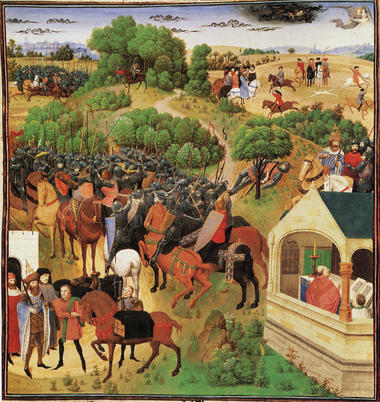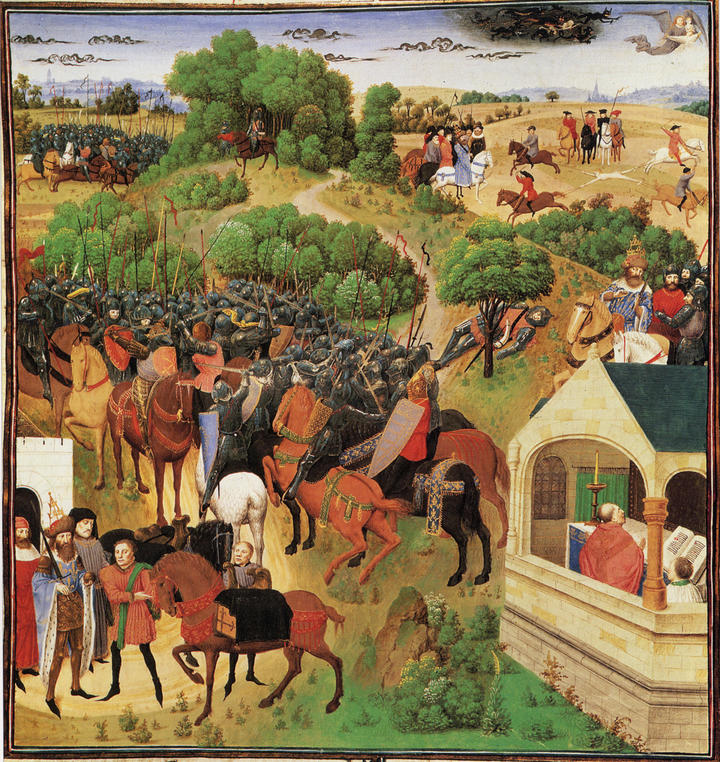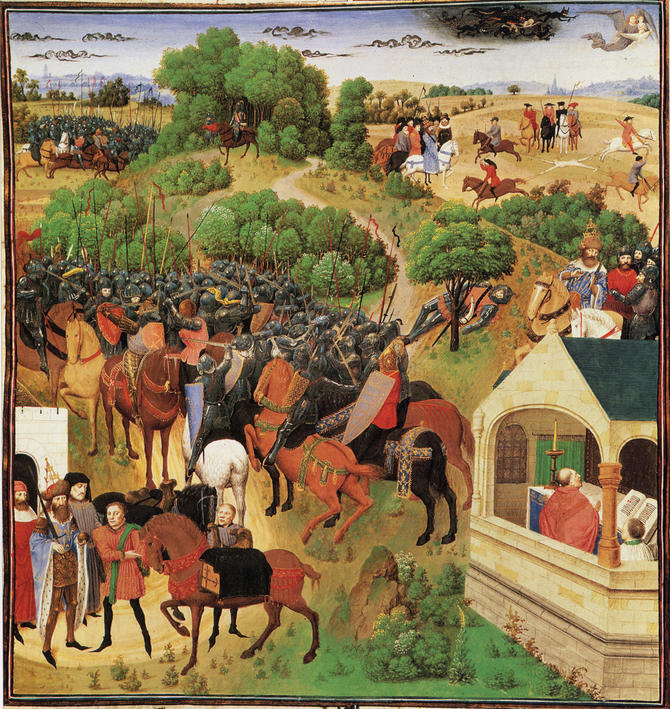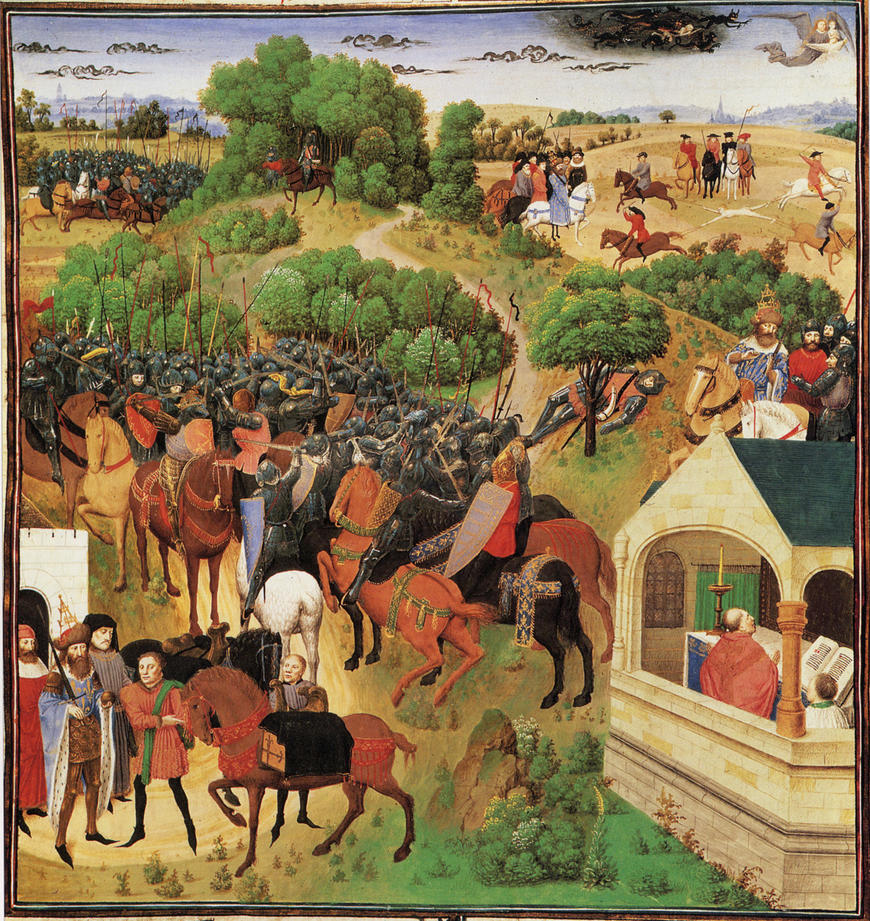



The Song of Roland belongs to the epic poems of medieval French literature and brightly represents French folk heroic epos. The authorship is considered to belong to a poet of genius called Turold, and the issue of the poem’s origins stays unsolved to this day. The chronological frames in which the manuscript appeared are estimated to float between 1040 and 1115.
The main events of the poem take place during Charlemagne’s conquest of Spain and fighting with Muslims there. There is the only city that left standing is Saragossa headed by the king Marsilla. The story unfolds between Saragossa and the camp of Charlemagne. And there we see the main character – Roland, the king’s nephew, brave, audacious, devoted to the cause. It is his merit that Franks conquered almost the whole of Spain. He is noble and honest knight without fear and beyond reproach. When there comes a question on the King’s council about a volunteer who would travel to Saragossa and pass Charlemagne’s demands to Marsilla, Roland offers himself as a candidate: "I might go very well." But his fellow Oliver talks him out of this idea: "For your courage is fierce unto the end, I am afraid you would misapprehend.” To my mind, this reflects the fact that Roland is a man of a hot temper. But although he possesses certain negative traits (which causes both praises and disapproval among his friends), he is a positive character, an epic hero, a perfect loyal warrior. But, unfortunately, being bold and courageous he lacks prudence, wisdom, and reason.
Ganelon is Roland’s stepfather and the king’s brother-in-law; he is mean, insidious and malicious. He has a strong hatred towards Roland, though we do not see the initial reason for such relations. Anyway, this abhorrence is so strong that Ganelon is even ready to sell his homeland in order to harm or kill his stepson. Probably, the factor of influence is that fact that the king appreciates Roland too much to let him go on such a dangerous mission, and at the same time, he thinks Ganelon to be expendable. We also know that he is proud (“Proud face he had...”), but the pride he possesses differs from the pride that is possessed by Rolland. Roland’s kind of pride implies overestimation of his power: when he and his friend Oliver saw Muslims come into attack he refused to wind the horn and call for help as Charlemagne with his army was not far yet: “Never, by God, I say, for my misdeed shall kinsmen hear the blame, nor France the Douce fall into evil fame!” Roland is too proud to bring shame upon his beloved kingdom. At the same time, Ganelon’s morbid pride stirs up desire for vengeance: he becomes a traitor for his homeland and to his wise king. He joins in a conspiracy with king Marsilla and the Saracens in order to destroy Roland and his rearguard. For his treason, he was paid – or it is better to say “bribed”: “Out of my store I'll give you wealth untold, charging ten mules with fine Arabian gold; I'll do the same for you, new year and old.” King Marsilla bribed Ganelon to buy his loyalty. This fact draws a parallel with the image of Judas, the great betrayer in Christianity.
In this poem, we see the canonical fight of good and evil, the eternal opposition of these two entities embodied by Roland and Ganelon. Probably these characters and everything they embody forms the most striking controversy of this literary work. From the point of view of medieval interpretation, good is equated in a certain way with the rules of vassalage and loyalty to the lord (Roland is presented as a perfect embodiment of the good), and evil is similar to feudal self-will and treason which makes Ganelon the universal embodiment of the evil. Their opposition becomes obvious during Charlemagne’s council. As we have mentioned earlier, brave Roland wanted to undertake the role of an ambassador and go to Marsilla but the king rejected his initiative. And then, when the barons offered Ganelon for this task he came out into the open and expressed his enmity towards Roland: "I love you not a bit; a false judgment you bore me when you chid.” Here we see anger and desire to take revenge, Ganelon threats to retaliate: "Fool, wherefore art so wrathful? All men know well that I am a good father; thou hast decreed, to Marsiliun I travel. Then if God grant that I return hereafter, I’ll follow thee with such a force of passion that will endure so long as life may last thee."
Ganelon and Roland have a few features in common, for example, noble origin, high rank, and pride, but they are brightly contrasted. Despite his hot temper, pride and sometimes excessive boldness, Roland is a man of virtue. Such common things as loyalty, courage, and friendship are understandable for him. He is deeply loyal to his uncle, the king, and to his comrade-in-arms Oliver. When Oliver perishes on the battlefield killed by the mean Muslims from Saragossa, Roland grieves over him: Together we have spent such days and years; no harmful thing twixt thee and me has been. Now thou art dead, and all my life grief." In contrast, common virtues are unavailable for Ganelon who chooses the way of a cruel and sly traitor that eventually brings him to miserable end: he is torn apart by 4 wild horses. “Guenes is dead, a felon recreant. Who betrays a man, need make no boast of that.” These words mean that Ganelon died as a coward and a traitor, and no felon must brag about his treason.